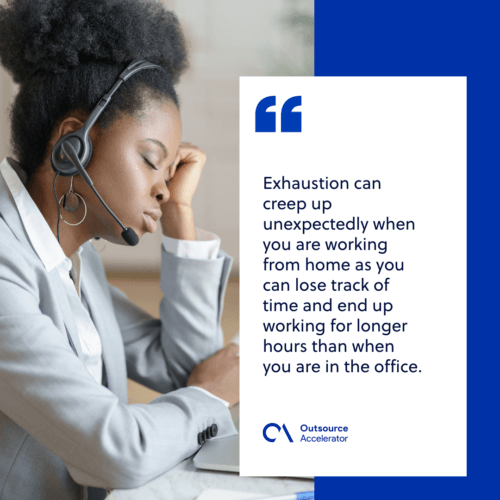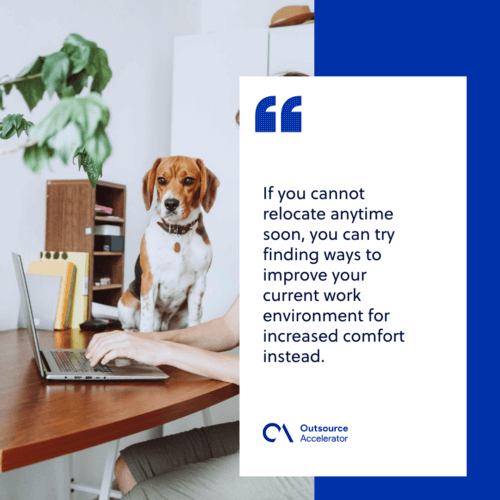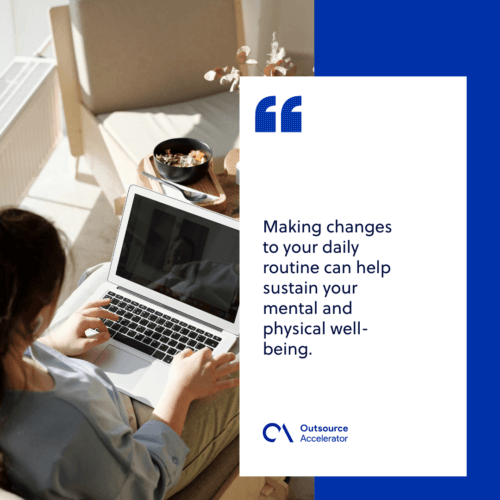10 tips for relieving work-from-home fatigue

The COVID-19 pandemic has drastically changed the business industry. While many companies were forced to close down, the ones who remain financially resilient and operational continue to find ways to adapt efficiently to the new normal.
One of these is by transitioning from a full-time office setup to a remote or hybrid structure where employees have the option to work from home.
While remote working has its advantages, this configuration can still pose challenges, such as experiencing work-from-home fatigue.
What is work-from-home fatigue?
Exhaustion can creep up unexpectedly when you are working from home as you can lose track of time and end up working for longer hours than when you are in the office.
Since you are working in the comfort of your own home, your mind tends to relax and ignore any stimuli of work stress.
After all, you perceive your home as your haven away from “office stress.” In reality, however, work stress[1] is already building up, eventually leading to work-from-home fatigue.

Alleviate work from home fatigue with these helpful tips
While there is no way to avoid experiencing work-from-home fatigue completely, there are ways you can lessen its occurrence.
Do some light workouts
Performing light exercises can help improve your body’s blood circulation, which is good for your health. It will keep your limbs from getting numb due to a lack of body movement.
Regular exercises can also help improve your mood, which lessens your stress levels and, ultimately, the occurrence of work-from-home fatigue.
Take short breaks
Time management problems are common in a virtual work setup as employees can sometimes overwork themselves. It is essential to take short breaks once in a while to refresh yourself.
A simple walk to the kitchen constitutes a short break, as well as going up and down the stairs. Like when you are doing light workouts, it can increase your body’s blood flow, which will keep you energized.
Taking short breaks can also help you refocus if you are distracted due to stress or non-work-related problems.
Take a vacation
If taking short breaks is not cutting it, then take a vacation instead. Sometimes, all we need to do is spend some time off work and focus our attention elsewhere.
With many places gradually relaxing their restrictions, it is probably a good time to go out and enjoy the outdoors.
For instance, why not book a couple of days at your favorite resort or invite some friends to travel? Take this opportunity to relax and not worry about work, as overthinking can also lead to work-from-home fatigue.
Set up a comfortable home workspace
Sometimes, the place you are staying at is just not conducive enough for a work-from-home configuration. If you cannot relocate anytime soon, you can try finding ways to improve your current work environment for increased comfort instead.
For instance, get yourself a new work desk, especially if the current one is already old and worn. If you work in your bedroom, try buying a bedtable for added convenience.
If the sun’s rays are getting through your windows and bothering you, replace your current curtains with thick ones to keep the sunlight from entering your room. Ensure your home workspace also has adequate lighting.

Lessen multi-tasking
Multitasking can make you efficient at work; however, it can exhaust you fast. After all, switching between tasks requires your full concentration and attention, which can be mentally and physically draining.
That said, lessening such instances can help you save mental and physical energy, keeping you from getting tired in a short period.
You can also rely on virtual assistants to take some of the work off your shoulders and give you more breathing room to do other things that require your attention.
Attend fewer meetings
While video conferences are essential, attending too many of them can be physically and mentally tiring.
Prolonged staring at the computer screen can also strain your eyes, and too much time spent hunched on your computer can also lead to back pains, contributing to work-from-home fatigue.
With that said, why not consider cutting down on the number of video conferences you attend? See if you can just deliver your message via email or a simple chat.
Unless the topic is crucial to your company’s business processes, you are probably better off not holding a video conference.
Set boundaries between work and home life
A work-from-home setup can sometimes mess up your daily routine. For instance, you would find yourself doing chores between office tasks or attending video conferences while taking care of your kids.
The effort you exert in doing these things can add up, giving you a feeling of prolonged work hours, which can become stressful.
However, establishing boundaries to separate your work life from your home life can positively impact your work-life balance.[2]
Keep away from your workspace when you are off work to focus on more important matters at home. Avoid answering work messages (unless they are urgent) during non-office hours to retain a sense of being at home.
Another alternative to lessen the risk of work-from-home fatigue is outsourcing some of your business processes, allowing you to spend more time doing the things you want while still being up-to-date with your business operations.
Avoid a monotonous routine
A work-at-home setup can lead to a boring routine as you repeatedly do the same job. Pre-pandemic, you could easily break away from this monotonous routine simply by interacting with the people around you.
However, this is no longer the case as most of you are now working off-site. While you are free from any form of office distractions, this work configuration can still lead to burnout.
Making changes to your daily routine can help sustain your mental and physical well-being. For example, if your work allows, switch to a mid or evening shift from time to time.
If you usually do gardening in the afternoon, you can do it in the morning and then work in the afternoon instead.

Do not skip meals
It may sound simple, but many employees forget to eat when working from home, especially when they are too focused on their tasks. They would postpone eating until they finish some of their work, especially if it is urgent.
Doing this, however, is very bad for your health.
Your body needs to eat as food is one of your body’s prime energy sources. By skipping meals, you will not be able to perform at your best, which can affect your productivity and work quality.
Make it a habit to eat once in a while to ensure that you have enough energy to deliver an excellent job.
Change your work environment once in a while
Working in the same place for an extended period can affect your sanity and productivity. Moving from your current work environment to a new one can be re-energizing as it serves as a means to break away from your monotonous routine.
For example, you can book a hotel room or, if you are feeling adventurous, camp in a forest and work there. Of course, it can be as simple as working at a cafe.
Regardless, try to find a way to switch work environments from time to time to prevent work-from-home fatigue.
In an attempt to combat this, some firms, like Boomering, provide state-of-the-art facilities for their offshore workers.
The importance of dealing with work-from-home fatigue
Work-from-fatigue can affect even the most motivated person. Let Outsource Accelerator help you deal with work-from-home fatigue.
We can help you match with the right outsourcing provider so you can offload select processes and allow your teams can focus on more essential tasks.
Check out our outsourcing directory or get your three free quotes today!
Article references:
[2] Work-life balance: Guest, D. E. (2002) ‘Perspectives on the Study of Work-life Balance’, Social Science Information, 41(2), pp. 255–279. doi: 10.1177/0539018402041002005.







 Independent
Independent




